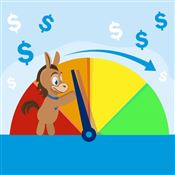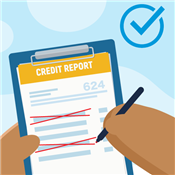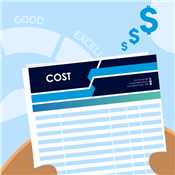How to Increase Your Credit Score
Poor credit score? You have plenty of options to get it back in good standing. Find out 10 quick ways to give your score a boost.
 |
- What's a Good Credit Score?
- 10 Fastest Ways to Improve Credit Score
- Factors that Influence Your Credit Score
- Best Practices to Maintain a Healthy Credit Score
- What's a Credit Score and How Is It Determined?
- What To Avoid When Improving Your Credit Score
- Situations When Your Credit Score Matters
- Should You Hire A Credit Repair Company?
Your credit score is one of the most important measures of your financial health.
But don't worry: If your score is lower than you want, you still have options.
In this guide, review the 10 ideas below for giving your credit score a quick boost. Plus, learn which factors affect your credit score to keep it in good shape.
What's a Good Credit Score?
Your FICO credit score is the most widely accepted credit metric and scores can range from 300 to 850.
A good credit score is between 670 - 739.
FICO classifies credit scores as follows:
- Poor: 300 - 579
- Fair: 580 - 669
- Good: 670 - 739
- Very Good: 740 - 799
- Excellent: 800 - 850
If your score is above 739, then your credit is Very Good or Excellent. And if it's below 670, then you have some work to do. But you'll learn how to improve your credit below, and you can start today.
10 Fastest Ways to Improve Credit Score
Low credit score? Here are 10 simple ways to improve it fast.
- Check your credit report
The first step to improving your credit score is to check your existing credit report. You can access your reports from all three credit bureaus: Equifax, Experian, and TransUnion. You should check your credit report once per year.Several services offer a free credit check annually:
Your credit report will show your payment history, open accounts, how much you owe, the age of your credit, and more. Use this information to determine which methods below can help you achieve the biggest score increase.
- Dispute errors on your report
One of the fastest ways to significantly improve your credit score is to get errors removed from your report.[1][2]What's considered an error? If you paid on time, but the payment is marked as late, you can dispute the transaction. Or if someone else's transactions damaged your credit.
Most negative marks on your credit should be cleared in 7 years. If one is still listed after 7 years, then you can submit a claim with the three credit bureaus to have it removed.
You could also hire a credit repair service to advocate on your behalf, but this is not necessary for most people. You'll learn if it's right for you below.
- Pay off delinquent debt
Any debt that has gone into collections will have a severe negative impact on your credit score.If your score is below the "Good" classification, you may have at least one account in collections. Paying these debts off will quickly increase your score.
You can also contact the debtor and set up a payment plan. This won't remove the derogatory marks from your credit. But on-time payments will add positive marks moving forward.
For accounts in collections or charge-offs, you can pay the debt in full or offer a settlement for accounts in collections or charge-offs. You'll see a good-sized jump in your credit score when these accounts are paid off.
Another option is to consolidate your debt. Debt consolidation loans benefit people with multiple debts, as they can conveniently reduce your many payments to just one. You may even qualify for a lower interest rate.
Or you could try opening credit cards and transferring the balances. Some credit cards offer 0% APY for a year or so. Then you can pay off your debt with no interest. But you must check the balance transfer fees, which are between 3% and 5%.
- Request a credit limit increase
Credit utilization has a significant impact on your score. As a result, raising your credit limit (while keeping your spending the same) will lower your credit utilization ratio. As a result, your score will improve. - Become an authorized user
One of the fastest ways to raise your credit score is to become an authorized user on another person's credit card. When you become an authorized user, the entire history of that account is added to your report.You can accomplish this in one of two ways:
- Purchase a "user tradeline" from an online marketplace like usertradelines.com. This will allow you to filter tradelines based on credit age, credit limit, etc. - but will cost you money.
- Ask a friend or family member if they will add you as an authorized user on one of their accounts. This method is free but requires a significant amount of mutual trust.
- Purchase a "user tradeline" from an online marketplace like usertradelines.com. This will allow you to filter tradelines based on credit age, credit limit, etc. - but will cost you money.
- Pay down overall debt
Reducing the total amount of money you owe can slowly improve your score over time. This can be accomplished simply by making on-time payments for all your outstanding accounts. - Set up AutoPay
Payment history makes up the biggest percentage of your FICO score, so making on-time payments every month is an absolute must if you want to improve your credit score.Setting up AutoPay for recurring payments like rent, utilities, cell phone bills, and car payments will ensure you never miss a payment.
Experian Boost could increase your score 13 points. Most credit reports don't factor in utility or Netflix streaming bills. But Experian Boost will count them. You'd just sign up, verify your bank, and specify the uncounted payments. - Limit hard inquiries
Credit inquiries occur when you apply for financing or check your credit score. But not every inquiry affects your score. This is the difference between hard and soft credit inquiries.A soft inquiry occurs when you check if you're "pre-approved" for a credit card, when you check your own credit using a service, or when an employer checks your credit.
When you apply for credit cards, loans, or rent an apartment, they'd do a full credit check. This is a hard inquiry.
Other types of hard inquiries:
- Mortgage applications
- Student loan applications
- Car loan applications
Types of soft inquiries:
- Background checks
- Employer credit checks
- Preapproval for mortgages and loans
FICO states that one hard credit inquiry will take less than five points off your FICO score. Multiple hard inquiries can drop your credit score a bit more for a few months to one year.
Try to limit the hard inquiries on your credit report to one per year.
- Mortgage applications
- Keep credit utilization below 30%
Ideally, you pay your credit card balance monthly to avoid paying too much interest. If you can't manage that, just try getting your credit utilization ratio below 30%. This will still have a positive impact on your score.Can using 100% of your credit balance, then paying it off in full hurt your credit score? Your credit card company only reports your financial activity to credit bureaus once a month. If they report it after you've paid your balance off, there will be no effect on your credit. If they report it before you've paid it off, your credit may be affected until next month. To minimize the effect, you could pay off your card balance as soon as possible. - Use a credit builder loan or app
Credit builder loans and apps are financial products designed to help people with bad or no credit build their score. Shop around for the best credit builder apps or the best credit builder loans to find the product most suited to your needs.You have a few options if you're paying a lot of interest each month on multiple accounts.
- Consolidation: Debt consolidation companies will buy all your debt so you only have one payment. Ensure the interest rate is equal to or less than your current interest payments.
- Balance transfers: Credit card companies often offer 0% APY on transfers from one credit source to another. This is an incentive to sign up for their card and lasts for a certain time, such as a year. You can transfer your high-interest debt to this new card with 0% interest. Just keep an eye on the balance transfer fees, which usually range between 3% and 5%.
- Personal loans: You could take out a low-interest personal loan to consolidate all your debts in one loan. Just be careful to shop for a lower interest rate since many personal loan interest rates can be very high.
Factors that Influence Your Credit Score
 |
FICO scores are calculated using the following formula:[3]
- Payment History (35%): The most important part of your credit score, payment history evaluates your percentage of on-time vs. late payments as well as delinquent remarks like bankruptcy and accounts in collection.
- Amounts Owed (30%): The second-largest consideration is how much you owe in different types of credit accounts. This includes the "credit utilization ratio," which calculates your credit card balance compared to your limit.
- Credit Length (15%): This refers to how old your existing credit accounts are. Older accounts are generally considered better because frequently opening new credit accounts suggests financial instability.
- Credit Mix (10%): This means having several different kinds of debt, such as credit cards, car loans, and student loans. Having a variety of credit types tells lenders you are capable of handling different kinds of debt.
- New Credit (10%): An evaluation of how often you apply for new credit lines (called hard credit inquiries) over the previous 12 months.
How to Maintain a Healthy Credit Score
Follow these tips to maintain your new and improved credit score over the long term.
Leave accounts open
If you pay off a revolving line of credit (such as a credit card), leave the account open instead of closing it. Closing old accounts will reduce your total credit age, and as a result, your score.
Only buy what you can afford
A good rule of thumb is to only purchase things you could afford in cash. If you can't afford an item by paying for it on your debit card, you probably can't afford that plus the interest it would accrue on a credit card.
Of course, there are some notable exceptions to this rule, such as buying a house.
Be patient
You won't improve your credit score overnight. But with sustained effort, people with bad credit can reach Very Good or even Excellent FICO scores in less than five years. The most important part of building a great credit report is consistency.
What's a Credit Score and How Is It Determined
Your credit score is a number between 300 and 850 that quickly shows financing companies how advantageous it might be to lend money to you. But your credit score can vary.
FICO and VantageScore are the two primary credit scores. Three credit bureaus use these reports to create their own scores. Then financing companies look at a combination of these sources when deciding to grant you financing.
Your credit score is determined by a complex algorithm that estimates how risky it is to loan you money. It specifically looks at the likelihood that you'll miss a payment for more than 90 days over the next 24 months.
Which factors affect your credit? Let's cover the specific variables which result in your credit score.
Situations When Your Credit Score Matters
Your score impacts your interest rate on loans and credit cards, the fees and deposits you have to pay, and your chances of getting a loan. All else being equal, you will pay less money and get better rewards if you have a good credit score.
Here are six situations where your credit score is often taken into consideration:
- Purchasing a home
- Buying or leasing a car
- Renting an apartment
- Applying for a credit card
- Requesting a business loan
- Applying for a job
What to avoid when improving your credit score
Improving your credit score will take some time, sometimes 5 to 7 years. During this time, you will want to avoid these things:
- Don't apply for a bunch of credit cards in a short time
- Don't leave a balance on your credit card from month-to-month
- Don't cancel your credit card after you pay it off
If you're having trouble making your payments, it's usually worth calling the company and trying to lower your payments. The financial institution wants you to stay on track with your payments, so many will be willing to work with you.
However, you have a few other options if you face financial troubles.
Should You Hire A Credit Repair Company?
Hiring a credit repair company is one option if you're overwhelmed with your debts. But they can't magically fix your credit. Everything they can do, you can do for free. Some of them are even scams.
The Federal Trade Commission warned consumers about credit repair scams, which are quite common. Basically, that old cliche applies. If it sounds too good to be true, it is.
If you want to get some help, several credit counseling agencies will assist you for free. They are:
- The National Foundation for Credit Counseling (NFCC)
- The Financial Counseling Association of America (FCAA)
These institutions will pair you with a credit counselor to set up a budget and manage your debt. They may offer to speak with lenders to lower your interest rates or waive fees. Or you may be able to use some financial calculators similar to these: the Debt Snowball Calculator or the Credit Card Payoff Calculator.
Some counselors charge a monthly fee, which will go towards paying down your debts.
If a credit repair company still sounds like a good fit for you, then you have some options. The Credit Repair Organization Act (CROA) places rules on how these companies must help you:
- You'll be shown a contract with your rights
- You'll be able to cancel for free for 3 days
- You'll receive an estimated time their services will help your credit
- You'll receive a total quote
- You'll receive a list of their promises
For most people, it's worth the time to improve your credit on your own or with the help of a free credit counselor. Then you can save money and use it to repay your debts.
The Bottom Line
There are numerous ways you can improve your credit score over time. The first step is obtaining a copy of your credit report to determine the best plan of attack.
By following the steps outlined in this article, you will be well on your way to achieving a great score.
References
- ^ Consumer Financial Protection Bureau. How do I dispute an error on my credit report?, Retrieved 5/3/2022
- ^ FTC Consumer Advice. Disputing Errors On Your Credit Reports, Retrieved 5/3/2022
- ^ myFICO. What's in my FICO Scores?, Retrieved 5/3/2022
Write to Justin Barnard at feedback@creditdonkey.com. Follow us on Twitter and Facebook for our latest posts.
|
|
| ||||||
|
|
|












